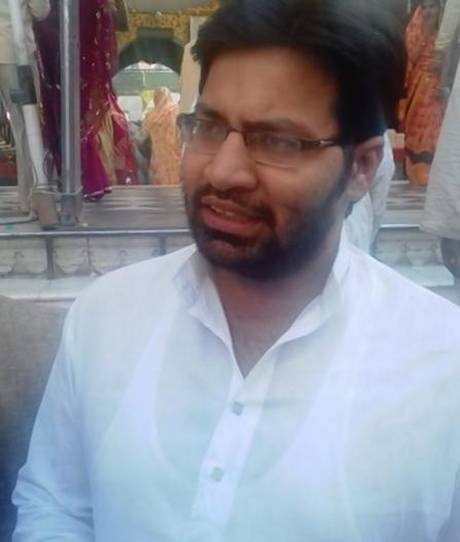Ajmer, RAJASTHAN :

In Ajmer North, party fields Ammad Chishti from the Khadim community, which traces its descent to Khwaja Fakhruddin Gurdezi, who accompanied Khwaja Gharib Nawaz on his move to Ajmer around the year 1190.
At first glance, Syed Ammad Chishti looks like an urban professional, juggling career and family. But the 26-year-old is the second member of the Khadim community here to contest an Assembly election.
The community of nearly 800 families occupies a prominent position in the hierarchy of the famed 13th century dargah of Sufi mystic Khwaja Moinuddin Chishti here. It traces its descent to Khwaja Fakhruddin Gurdezi, who accompanied Khwaja Gharib Nawaz on his move to Ajmer around the year 1190.
As the custodians of the monument, the Khadims have unrivalled access to the inner sanctum and perform all the rituals and ceremonies at the tomb.
Religious service
As Khwaja Gurdezi was the Khadim-e-Khas (chief attendant) of Khwaja Gharib Nawaz, Khadims consider it their religious obligation to serve the tomb and receive all offerings.
The Mughal emperors, Hindu kings and later the British government had liberally granted jagirs (land grants), honours and rewards to Khadims.
Almost no Khadim family migrated to Pakistan during Partition, staying back to protect the shrine from pillage and plunder.
Abysmal conditions
Mr. Chishti, the youngest municipal councillor of the Ajmer Municipal Corporation, is contesting on Bahujan Samaj Party ticket in the Ajmer North constituency, where the historical dargah is situated.
“I represent the hopes and aspirations of not just the Khadims but all the people residing here,” he told The Hindu.
Syed M. Ayas Maharaj was the first Khadim to contest an Assembly election.
He won on Congress ticket in 1980, defeating Ramzan Khan of the nascent BJP by a margin of 2,825 votes.
Mr. Chishti points to the “pathetic condition” of the dargah area in the foothills of Taragarh, and the BJP government’s alleged neglect.
“We are supplied water once in three days in this area with a high population density. Pipelines from the Bisalpur dam were laid for Ajmer, but the water has been diverted to Jaipur,” he says.
It is not just the 45,000-strong Muslim electorate in Ajmer North that Mr. Chishti is banking upon. “Education Minister Vasudev Devnani has been elected thrice from here. Look what he has done, other than distorting history and changing the school curriculum. People are fed up,” he says.
Mr. Chishti says he will reach out to all the communities, let they be Sindhi, Vaish or Brahmin, with the promise of better living conditions and good governance.
Mr. Chishti, father of a two-year-old boy, says his political ambitions are rooted in his desire to bring about a change.
It was his father, Shamim Chishti, who had introduced the BSP in the dargah area. The young man went to Lucknow to meet party supremo Mayawati with a request for ticket. “Mayawatiji encouraged me to work for people’s welfare. She may address a public meeting in Ajmer on November 28,” he says.
Justice denied
Though Mr. Chishti does not mention it, there is an underlying bitterness among the Khadims over the government’s failure to punish the perpetrators of the 2007 blast at the dargah, in which three persons were killed.
Though the National Investigation Agency Special Court in Jaipur convicted two RSS functionaries in 2017, the Rajasthan High Court suspended their life sentences and released them on bail.
While Wahid Angara Shah, secretary of the Anjuman Khuddam Syedzadgan, a Khadims’ representative body, says politics should be kept out of dargah affairs, Anjuman member Sarwar Chishti, who had lodged the complaint in the blast case, alleges that the NIA had weakened the case after the change of government at the Centre in 2014.
source: http://www.thehindu.com / The Hindu / Home> Elections> Rajasthan 2018 / by Mohammed Iqbal / Ajmer – November 23rd, 2018








